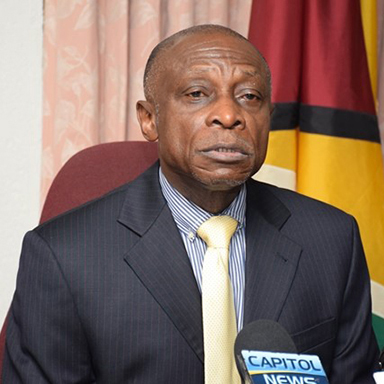Guyana’s Foreign Secretary Carl Greenidge has called for Guyanese reporters to embrace specialized reporting as means to provide more informed and in-depth issue-based journalism in an age when misinformation and false news can threaten developmental goals.
Speaking at the Guyana Press Association (GPA) Awards Dinner held on Saturday, Greenidge lamented that while government seeks a legal end to the controversy surrounding Guyana’s border with Venezuela the tale of the matter is being shared with the world in manner that is “distorted and untrue”.
“Venezuela or its agents have been placing pieces in our press. Such material has, for example, been inserted by a mouthpiece of Venezuelan imperialists, ostensibly an NGO called MAPA, ‘Our Sun Rises in the Essequibo’, proclaiming its right to an area of land the Government of Venezuela never governed and on which Simon Bolivar neither ever set eyes nor liberated,” the Foreign Secretary noted.
He drew specific attention to an image shared by Venezuelan President Nicolas Maduro on the occasion of the 53rd anniversary of the signing of the Geneva Agreement on Feb 17 2019. Maduro claimed that the image was of persons signing the agreement in 1966 but the picture was not actually of British and Venezuelan negotiators but of a meeting that had actually taken place in 1949, 17 years earlier.
He called for the Guyanese press to equip itself to handle complicated issues and to understand ‘the plot’ and offered to brief key media personnel on the issue.
He however noted that this offer has been rebuffed even as less than accurate content is reported in local media.
The former Foreign Minister stressed that contrary to reports, the Geneva Agreement signed on February 17th 1966 to resolve the controversy makes no mention of either land transfers or of the Essequibo and the question of non-development of any area within the boundaries of the Guyana and Venezuela was limited to the period 1966-70 when a Joint Commission was to have been considering practical solutions.
He reiterated that the 1899 Arbitral Award defines Guyana’s boundaries with Venezuela noting that Guyana is seeking a judgment from the International Court of Justice (ICJ) on the contention by the Venezuelan Government that Award is null and void.
Explaining that while an advisory opinion of the ICJ has the weight of the Court’s prestige and international recognition of the Court’s views, Guyana is not seeking an advisory opinion but a judgment.
“Failure of a party to honour an ICJ judgment may bring action by the Security Council,” he explained as the reasoning behind this decision.
Though Venezuela has managed to raise in the mind of many casual observers the question of the Court’s jurisdiction, Greenidge took time to note that Article 36 paragraph 1 of the Statute of the Court provides for the Court to have jurisdiction in all matters specially stipulated in treaties and conventions that are in force on the date of the institution of proceedings. In such instances, the Court may be seized by means of a written unilateral application.
Further while Venezuela has said it will raise an objection to the Court’s jurisdiction it would be left to the Court to consider whether such consent was established in the Geneva Agreement.
Failure by one party to appear does not prevent consideration of the case but if Court first satisfies itself that it has jurisdiction.
Meanwhile, while the matter before the Court does not directly affect the oceans, Guyana’s Exclusive Economic Zone (EEZ) or the operations of companies on our continental shelf, the Government has however taken the opportunity of the Court’s examination of the validity of the 1899 (Paris) Arbitration Award to have the ICJ confirm the sea-space appurtenant to Guyana’s land territory since the refusal of Venezuela to honour the land boundary that it demarcated and agreed in 1905 makes the maritime or EEZ issue relevant to the case now before the Court.
“Guyana is seeking confirmation that, in keeping with the UN Convention on the Law of the Sea (UNCLOS), as owner of the territory from Punta Playa to the Courantyne it enjoys all relevant sovereignty and sovereign rights over the oceans associated with its 459km long Atlantic Coast and territorial sea,” Greenidge concluded.






